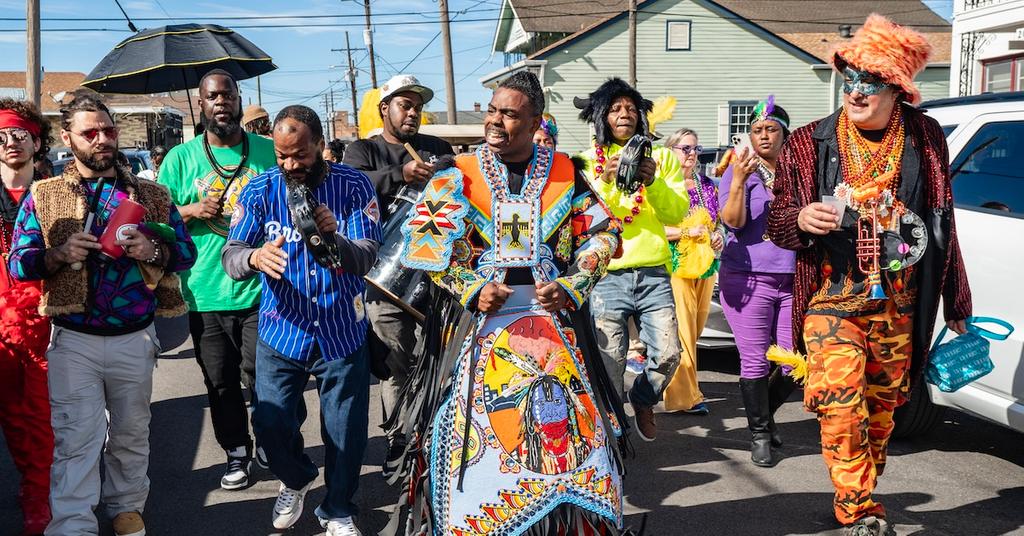Do they celebrate Mardi Gras in Korea? This question might seem unusual at first glance, but it opens the door to an intriguing exploration of cultural exchange and global festivities. Mardi Gras, traditionally a vibrant celebration with roots in Catholic traditions, has found its way into various corners of the world, including Korea. In this article, we will delve into the cultural dynamics that make Mardi Gras a global phenomenon and examine how Korea integrates such international festivities into its own rich tapestry of traditions.
Mardi Gras, often referred to as Fat Tuesday, is a carnival celebration observed in many parts of the world, especially in countries with strong Catholic influences. However, globalization has made it possible for cultures to adopt and adapt foreign traditions, leading to unique interpretations. Korea, known for its dynamic cultural scene and openness to global influences, offers an interesting perspective on this festive occasion.
As we explore whether Korea celebrates Mardi Gras, we will uncover the cultural significance of such celebrations, the ways they are adapted, and the impact they have on local communities. This article will provide a comprehensive understanding of how global traditions can coexist with local customs, offering insights into the evolving cultural landscape of Korea.
Read also:Whitney From Southern Charm A Deep Dive Into Her Life Career And Influence
Table of Contents
- Introduction
- History of Mardi Gras
- Korean Cultural Landscape
- Do They Celebrate Mardi Gras in Korea?
- Formats of Celebrations
- Impact on Local Communities
- Economic Effects of Mardi Gras in Korea
- Cross-Cultural Exchange
- Future Trends in Festive Celebrations
- Conclusion
History of Mardi Gras
Mardi Gras, originating from medieval European traditions, has a rich history deeply rooted in religious and cultural practices. It is primarily celebrated as a last day of indulgence before the Lenten season in Christianity. The origins of Mardi Gras can be traced back to ancient Roman festivals like Saturnalia and Lupercalia, which celebrated fertility and the coming of spring. Over time, these celebrations evolved and spread across Europe, eventually reaching the Americas through colonization.
Traditional Mardi Gras Celebrations
In countries like Brazil, France, and the United States, Mardi Gras is marked by parades, masquerade balls, and feasting. The most famous Mardi Gras celebrations occur in New Orleans, where the event has become a symbol of cultural identity and tourism. These celebrations often feature vibrant floats, colorful costumes, and the throwing of beads and trinkets to the crowd.
While the core essence of Mardi Gras remains tied to its religious roots, its modern-day celebrations emphasize community, joy, and cultural expression. This adaptability has allowed Mardi Gras to transcend geographical boundaries and find new homes in unexpected places, including Korea.
Korean Cultural Landscape
Korea boasts a vibrant and dynamic cultural scene that seamlessly blends traditional values with modern influences. Known for its rich history, Korea celebrates numerous traditional festivals such as Lunar New Year (Seollal) and Chuseok. However, the country's openness to global cultures has led to the adoption and adaptation of foreign traditions, including Christmas, Valentine's Day, and more recently, Mardi Gras.
Cultural Adaptation in Korea
Koreans are known for their ability to embrace and adapt foreign traditions while maintaining their cultural identity. For example, Christmas in Korea is celebrated more as a romantic holiday rather than a religious one, with couples exchanging gifts and enjoying festive dinners. Similarly, Mardi Gras has been adapted to fit the Korean cultural context, often incorporating local elements such as K-pop performances, traditional Korean costumes, and fusion cuisine.
This cultural adaptability is driven by Korea's global influence, particularly through its entertainment industry (K-pop and K-dramas) and its status as a hub for international tourism. As a result, Korea has become a melting pot of cultures, where global traditions like Mardi Gras can thrive alongside local customs.
Read also:Antinia Mackenzie Unveiling The Life And Achievements Of A Remarkable Figure
Do They Celebrate Mardi Gras in Korea?
Yes, Mardi Gras is celebrated in Korea, albeit in a unique and localized manner. While it may not have the same scale or historical significance as in countries like the United States or Brazil, Mardi Gras in Korea is gaining popularity, especially among younger generations and expatriates. The celebration often takes place in major cities like Seoul, Busan, and Jeju, where international influences are more pronounced.
Local Celebrations
In Seoul, Mardi Gras celebrations are typically organized by international communities and cultural organizations. These events often feature parades, live music performances, and food stalls offering both traditional Mardi Gras dishes and Korean cuisine. For instance, the Itaewon district, known for its multicultural atmosphere, hosts annual Mardi Gras events that attract locals and foreigners alike.
Busan, Korea's second-largest city, also celebrates Mardi Gras with a focus on beachside festivities. The city's vibrant nightlife and proximity to the sea make it an ideal location for hosting carnival-like events. Similarly, Jeju Island, a popular tourist destination, incorporates Mardi Gras into its annual festival calendar, drawing visitors from across the globe.
Formats of Celebrations
The format of Mardi Gras celebrations in Korea varies depending on the location and the organizing group. Generally, these events include:
- Parades featuring floats and performers dressed in colorful costumes
- Live music performances, often incorporating K-pop and international genres
- Food stalls offering a mix of traditional Mardi Gras dishes and Korean fusion cuisine
- Cultural workshops and activities that allow participants to learn about both Korean and international traditions
These celebrations are designed to be inclusive, catering to both locals and international visitors. They provide an opportunity for cultural exchange and foster a sense of community among diverse groups.
Impact on Local Communities
The celebration of Mardi Gras in Korea has a positive impact on local communities, promoting cultural understanding and economic growth. By hosting international events, Korean cities attract tourists and generate revenue for local businesses. Additionally, these celebrations provide a platform for cultural exchange, allowing locals to learn about global traditions while sharing their own.
Educational Opportunities
Many Mardi Gras events in Korea include educational components, such as workshops and lectures on the history and significance of the celebration. These activities help to deepen participants' understanding of the cultural context behind Mardi Gras and encourage cross-cultural dialogue. As a result, local communities become more aware of global traditions and their importance in fostering international relationships.
Economic Effects of Mardi Gras in Korea
The economic impact of Mardi Gras celebrations in Korea is significant, contributing to the growth of the tourism industry and local economies. Events like Mardi Gras attract visitors from across the globe, boosting hotel bookings, restaurant reservations, and retail sales. According to a report by the Korea Tourism Organization, cultural festivals account for a substantial portion of the country's tourism revenue.
Job Creation
Beyond tourism, Mardi Gras celebrations create job opportunities in various sectors, including event planning, hospitality, and entertainment. Local artisans and performers benefit from increased demand for their services during these events, while small businesses see a rise in sales due to the influx of visitors. This economic boost helps to sustain local economies and supports the development of cultural industries.
Cross-Cultural Exchange
Mardi Gras celebrations in Korea exemplify the power of cross-cultural exchange, showcasing how global traditions can be adapted and embraced by local communities. Through these events, Koreans and international visitors alike have the opportunity to experience the richness of diverse cultures and traditions. This exchange fosters mutual respect and understanding, promoting harmony and cooperation among different groups.
Globalization and Cultural Identity
While globalization has facilitated the spread of international traditions like Mardi Gras, it also raises questions about cultural identity and authenticity. In Korea, the adaptation of foreign traditions is seen as a way to enhance cultural diversity while maintaining national pride. By incorporating local elements into global celebrations, Korea demonstrates its ability to balance tradition and innovation, setting an example for other countries navigating similar cultural dynamics.
Future Trends in Festive Celebrations
As Korea continues to embrace global traditions, the future of festive celebrations looks promising. With advancements in technology and increased connectivity, cultural exchange will become even more accessible, allowing for the sharing of traditions across borders. Mardi Gras in Korea is likely to evolve, incorporating new elements and reaching wider audiences, while still maintaining its unique cultural identity.
Additionally, the rise of digital platforms and virtual events will enable more people to participate in celebrations like Mardi Gras, regardless of their physical location. This digital transformation will further enhance the global reach of cultural traditions, fostering a more interconnected world.
Conclusion
In conclusion, the celebration of Mardi Gras in Korea highlights the country's ability to embrace global traditions while maintaining its cultural identity. Through vibrant celebrations and inclusive events, Korea fosters cross-cultural exchange and promotes understanding among diverse groups. The economic and social benefits of such celebrations are significant, contributing to the growth of local communities and the tourism industry.
We encourage readers to explore the world of Mardi Gras in Korea and experience the unique blend of global and local traditions firsthand. By attending these events, you not only support local economies but also contribute to the promotion of cultural exchange and understanding. Share your thoughts and experiences in the comments below, and don't forget to explore other articles on our site for more insights into global traditions and cultural dynamics.


